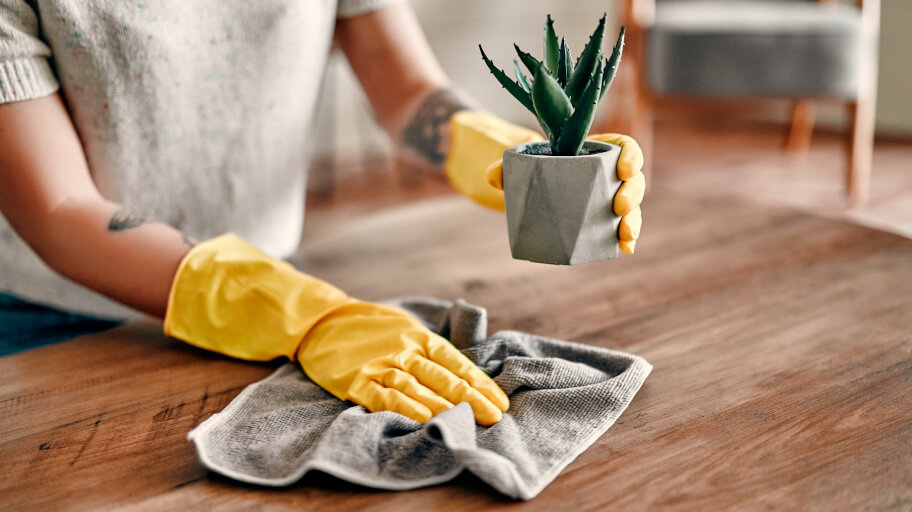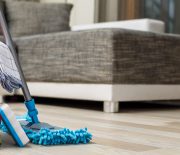Last update: 5 months ago

Dust in the house isn’t like washing up or laundry, only generated when you do things. If you stayed in bed all day or went on holiday for a month, (wouldn’t that be nice!) your house would still get dusty. It’s doubtful that there’s such a thing as a totally dust-free home anywhere in Australia or anywhere in the world. But don’t despair! There’s a lot you can do to make dust removal easier and less time-consuming.
In this article, we will give you some useful information on what dust is and why you need to minimise it. We’ll also share some pro tricks on how to remove dust effectively and how to stop your house from getting so dusty again.
Why is the house so dusty?
Dust is composed of lots of different tiny particles, anything that’s light enough to become airborne counts as dust. Some of these particles are more problematic than others. Any dust particles you inhale can irritate your lungs, some are protein-based and can trigger asthma or other allergic conditions. Bacteria, viruses and fungal spores can also be found in dust and could make you ill.
If you’re wondering ‘why is there so much dust in my house?’ Here’s a list of the different particles that commonly make up house dust.
- Tiny particles of dirt – Brought in on your clothes and shoes or blown in by the wind every time you open the door.
- Pollen – From plants flowering outdoors, or cut flowers and houseplants indoors. Pollen is a major trigger for allergies.
- Pet dander or hair – Flakes of skin shed by your pets If you’re wondering ‘why is my room so dusty?’ consider how much time your pets spend in it.
- Dead human skin cells – Yes, yuch! But humans shed skin cells, typically around 30,000 to 40,000 per day!
- Pollutants from traffic – If you live near a busy road, then you are close to a major dust generator.
- Other particles – Including microscopic bits of food, animal and insect waste, insect eggs, lint from the dryer, tiny bits of paper and more.
- Pathogens – Bacteria, viruses, fungal spores and other nasties that are present in the air to a greater or lesser extent all the time.
- Recycled dust – Trapped in carpets, linens, soft furnishing or air filters and stirred up to reenter the air for various reasons.
How to get rid of the dust
You can’t entirely stop dust from being generated so the question is how to get rid of dust. If you’re wondering how to eliminate dust in your home, read on. Professional cleaners have to work efficiently and understand the best way to clean dust.
Dust the right way – from top to bottom
When you’re dusting, work with gravity – not against it. That means starting your cleaning at the highest possible levels and working down. Dust settles on ceilings and walls, as well as floors. When you’re dusting bookshelves start at the top and work down.
You’ll collect dust more effectively if you use the right tools for the job, microfibre cloths trap dust much more effectively than feather dusters and anytime the surface you’re working on allows it, dampen the cloth slightly before you start.
There are a few spots in your home that are real dust traps and often get overlooked, things like plant leaves, window blinds and skirting boards. A little time invested in cleaning them will make a big difference to reducing the levels of dust in your home.
Improve carpet and upholstery care
Vacuum all carpets, rugs and soft furnishings at least once a week, in high traffic rooms you may need to update this to every other day. Empty the vacuum cleaner frequently so it works at maximum efficiency, all the better if you can do this outdoors. Consider having your upholstery cleaned professionally every once in a while.
Change or clean vacuum cleaner filters regularly and if your vacuum cleaner doesn’t have a HEPA (high-efficiency particulate air) filter consider upgrading to one that does.
Small non-washable rugs can be beaten outdoors as an alternative to or in addition to vacuuming. One simple trick to eliminate dust that’s often overlooked is to vacuum under rugs, as well as on top of them.
However, even regular vacuuming can do so much for eliminating all the dust. Particles trapped deep into the fibres of a carpet can be thoroughly extracted with more advanced methods, such as a specialised steam cleaning.
Sign in for a professional carpet cleaning!
Reduce the dust levels in your home and improve the lifespan of your carpets.
Clean HEPA filters, AC vents and ceiling fans regularly
When you’re thinking about how to get rid of dust in a room, remember that air filtration or ventilation systems also can trap high levels of dust. As soon as you switch the air conditioning or fan on, any dust trapped inside or collected on top of them will be distributed around the room, which is the last thing you want.
AC vents and ceiling fans can be vacuumed or dusted with a damp microfibre cloth, whichever is most convenient for you. Some vent grilles can be popped out easily and cleaned in the dishwasher or washed by hand. Clean HEPA filters according to the manufacturer’s instructions and change them at the recommended frequency. You’ll reduce dust even more if you get your HVAC ducting cleaned and serviced, but that’s a job for specialists.
Change linen more frequently
Remember those 30,000 to 40,000 skin cells shed per day? A fair portion of them ends up in your bed. If you’re wondering how to get rid of dust in the bedroom, start by washing bed linens at least once or twice a week.
Pillows need cleaning, too. Some can be washed in the washing machine while others can benefit from manual care. Just check the label to be on the safe side. If your pillows are dry clean only, treat them at least once a year. You can go the extra mile and also beat them outdoors along with the rugs and leave them out on a sunny day. The UV rays in sunlight have sterilising properties and exposure to fresh air will erase any traces of bad smells.
Vacuum and mop floors
Hard floors may not trap dust the way carpets do but dust still settles on them. Vacuuming your floors and furnishings will reduce dust in your home, don’t forget the corners and areas under the furniture. Some hard floors can be damp mopped which is also a very effective way to collect any leftover dust after the vacuuming.
How to reduce indoor dust
As mentioned before, dust particles can find their way into your home in many different ways. While stopping dust 100% is likely impossible, there are still things to try that will help at least reduce it. Here are some ideas on how to keep dust away from the bedroom and other rooms in the house.
- Ban outdoor shoes – It’s estimated that around half the dust in a house gets carried in on shoes and clothes. Asking guests to strip at the doorstep will get you talked about but there’s absolutely no reason why you can’t ban outdoor shoes from your home. If you’re trying to figure out how to stop dust in the house, make banning outdoor shoes your number one priority. Provide slippers or go barefoot if your flooring allows it.
- Place doormats – This is less effective for preventing shoe dirt than taking the shoes off but, it’s still worth trying. Doormats could stop dust from getting into the house from underneath the front door. A mat inside and one outside can provide even better blockage. If your external doors have large gaps and you live in a traffic-rich area, then a draft excluder on the front door can also help. This will keep dust out of the rooms and prevent heat from escaping too.
- Reduce or remove carpets – Sure they’re comfortable to step on but all carpeting trap dust and are a breeding ground for bacteria. If you want to stop the dust from spreading through the house, eliminating or at least limiting the number of carpets and rugs is the way to go.
- Install an air purifier – Use an air purifier to trap dust particles before they have a chance to settle onto surfaces or into carpets and soft furnishings. Don’t go half-measures on this. Choose a purifier with a high-quality HEPA filter that’s capable of trapping tiny particles and will even kill mould spores. Make sure you change the filter when it’s due, though, or you could end up cycling the air through a system that adds dust rather than taking it away.
- Groom pets outdoors – Pet hair traps dirt from outside and when you groom a dog or cat you’ll release both that dirt, dander and tiny hair particles, too. If possible, try grooming your furry friends outdoors.
- Declutter frequently – Every surface in your home is a place for the dust to settle. If you have more decorative pieces and limited time to clean them, they’ll just collect dust and make your home look uncared for. Piles of papers or magazines can trap dust too, so try to go through them on a weekly basis. Additionally, accumulated clutter makes cleaning more time-consuming and less efficient.
Takeaways
- Dust doesn’t just make you feel uncomfortable at home, it’s also bad for your health and can easily trigger allergies.
- It’s impossible to eliminate dust entirely, but clever cleaning will help you reduce it without investing all your free time in housework.
- There are ways to reduce the amount of dust that gets into your home, banning outdoor shoes is the number one trick while blocking the front doors’ gap is another thing to consider.
- Consider investing in a cleaning service to take some chores off your shoulders.
Can’t win the fight with the dust?
Enlist the help of a cleaning specialist and feel the difference!








